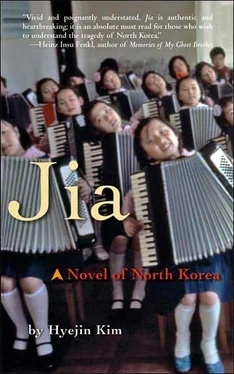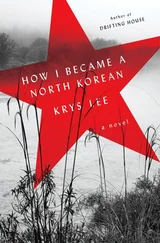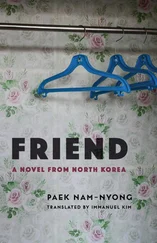Several soldiers in dark-green uniforms and broad-brimmed hats paced along the river, looking nervous.
“Today is a good time,” Sangwon said, with a satisfied smile.
Four big military vans were crossing the bridge, coming from China.
“Those cars are coming from the Baekdu Mountains,” Sangwon said, pointing casually.
The vans stopped in front of a white, four-story building, where several soldiers were waiting. A man wearing a lighter-green uniform got out of one of the vans, and a soldier approached him. They saluted each other and began talking. Other soldiers opened the back door of each van, and prisoners bound together by a thick rope emerged. The rope was tied around the first captive’s hands, behind his back, and looped around the next captive’s waist and hands. About ten people were chained together in that way. Some lowered their heads, others looked around. The soldiers kicked them; when one fell down, others in the same line staggered. The soldiers made each group of prisoners stand in one line. Then they pushed them into the white building.
“They’ll be very busy, today,” Sangwon said without taking his eyes from the scene.
“Who are they?”
“Those people were held in a detention center in China. The Chinese policemen are sending them under guard to this side. When I was caught, I was one of them too. There are so many today, more than a hundred…” Several children appeared to be Sangwon’s age, and he tensed at the sight of them.
After everyone disappeared inside the building, the soldiers gathered together. Drivers got out of the cars and exchanged cigarettes.
“First, they must divide up the prisoners according to where they will be sent,” Sangwon said. “They’ll start interrogating them tonight. Sooner or later, we’ll hear screams from in there.” He pointed with his chin toward the ugly old building.
I swallowed hard. Sensing my nerves, Sangwon patted my shoulder and said, “It’s good luck for us, it means the lookout will be distracted tonight. Most of the soldiers will be in the building keeping watch over the prisoners.”
Sangwon grabbed my coat lightly. “You are lucky. Tonight is a good night.” He lowered himself further into the bushes, and his hat covered his eyes and nose so that I could only see his lips moving. “We have to be really careful, though, or we’ll end up with them. Let’s wait until sunset.”
We lay down under the bushes for a while, and I heard the vans drive away. Pressing my whole body into the grass, I felt a sudden ache in my back and hips, and clenched my teeth, so as not to groan. After a while, the pain subsided. Several days of travel had taken a toll on me.
I tried to ignore the tremors shaking my body, but they wouldn’t stop. When I looked up, I only saw Sangwon’s glittering eyes looking down at me; the rest was dark. I tried to stand up, but Sangwon pushed my shoulders down, hard.
“Sh!” He covered his lips with his index finger. “Come here.” He dropped to his knees and motioned for me to follow him. We were heading toward the river.
“You should swim as quietly and quickly as possible. Even if the soldiers discover us, don’t stop, okay? Sometimes when they shout, “Stop,” people feel they really ought to stop. Some old people actually stop in the middle of crossing the river. I’m not lying. So I’m warning you in advance: Never, never stop. Don’t even hesitate.”
With a serious expression on his small face, he continued, “When we reach the other side, don’t be relieved yet. Don’t stop moving. Don’t make too much noise there, either; there are also Chinese security guards trying to catch us. As soon as we find the bushes, we’ll run for them and hide for a while.”
When we reached the river, I froze and stared at what seemed like a dark floor spread out before me. The land on the other side looked much farther than I had estimated in the daylight.
Sangwon took off his clothes and rolled them up, putting them in his hat, which he held on the top of his head. His bones protruded from every angle of his body.
“Let’s go.”
Sangwon threw his body into the river while I took off my coat and shoes, stripping down to my underwear. Even surrounded by darkness, I couldn’t help looking around for eyes spying on my half-naked body. I folded my clothes and shoes into my backpack, and tied the strings of the bag around my neck, to prevent the contents from getting wet.
With a throbbing heart, I stepped into the river. My teeth clenched hard and my body tingled with cold. The water only reached my navel. I looked at Sangwon. The water was almost at his shoulder.
He looked like a ghost, his body lost below the shoulders, creeping on a black floor. I thought I might be dying—the cold was cutting my flesh like a knife. Despite Sangwon’s warning not to turn my head, I looked back at the white building and the water we had already crossed. The lump of the white building in the swallowing darkness looked even more run down; I swam for my life.
When we reached the far riverbank, I toppled out of the water and onto the ground. The cold wracking my body held me in place. My teeth were chattering, and Sangwon gestured for me to bite down on the string of my backpack. There was no time to rest, so we stumbled to some nearby bushes and I sprawled out flat on the ground. I couldn’t think; I couldn’t even hold up my head. I closed my eyes tight. Straining my ears, I tried to catch some sound, but it was deathly quiet. The cold wind made my water-soaked clothes even colder, and I held Sangwon’s hand tightly. I was relying on the strength of a boy with such small shoulders. He nudged my hand and gestured to me to put on all of my dry clothes, just as he was doing; there was no shame or shyness left. I slipped off my undergarments and changed into dry clothes, but the chill had settled into my body for good. Again, we waited in the bushes without stirring.
I don’t know how much time passed. Sometime later, in the darkness, Sangwon pulled me by the hand and we stole deeper into the strange, new land.
We moved at night and hid under bushes in the daytime, walking through the mountains on sequestered roads. We were afraid of running into wild animals, but there was no choice. Before the sun rose, we would find some tall grass and try to sleep; my mind could never completely rest, despite my body’s utter exhaustion. Sangwon complained that walking through the mountains took two or three times longer than using the regular road. I prayed not to be detected no matter how long it took.
I wondered what was happening back in Pyongyang; had Director Park and Seunggyu discovered my disappearance? I hoped I hadn’t caused trouble for Director Park.
It didn’t feel as if the ground I was stepping on was that of a different country. The grass, rocks, trees, and sky were the same as those I knew in North Korea. Sometimes, from the bushes, we saw farmers or houses in the distance; the houses had exactly the same shape as ours, and the farmers’ faces and clothes didn’t seem so different from mine. I kept reminding myself, I’m in a different place now. All of this is new.
Sangwon and I were so afraid, we barely talked as we walked. Sometimes we gestured to each other or whispered, “Don’t worry.” That was all we could do. The food we had brought was already gone, and we needed to preserve our energy. Sangwon would pull the bark from a certain kind of tree and strip off the white insides for us to chew. Chewing made the wood softer; eventually I could taste some flavor, and the bark kept us from starving.
The deeper we got into the mountains, the safer we felt. Sangwon explained that we were going to the cave he stayed in whenever he crossed the river. He said he heard people had made the cave decades ago as a dugout to hide from a Japanese attack. There were several such dugouts deep in the mountains where people like us stayed.
Читать дальше












